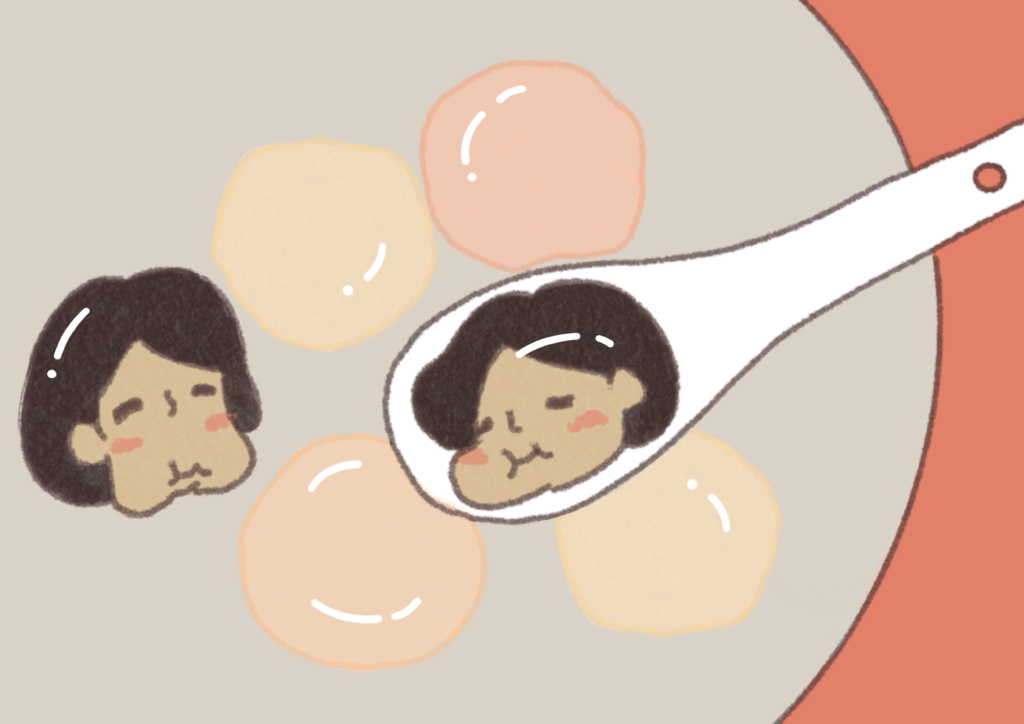ang yuan (汤圆) was my childhood favorite breakfast, coveted dessert and warm hug after a long piano recital. Tang yuan is a Chinese traditional dessert consisting of glutinous rice balls filled with rich pastes like sesame, peanut butter, red bean and taro. The filling hides inside the stretchy exterior, making every bite of tang yuan a complete and fulfilling experience.
In addition to tasting like heaven, tang yuan is a meaningful food to share with my family. In Chinese culture, it represents the separation of our interests, lifelong habits and character traits. Tang yuan is a symbolic homophone of tuan tuan yuan yuan — a Chinese proverb for unity.
The dou sha tang yuan, ones with red bean filling that were my older sister’s favorite, play a significant role in shaping my life. When I was in elementary school, my “who do I want to be when I grow up” poster always blared: “my sister.” I wrote two too many essays about how cool she was (unlike most six-year-older siblings), journaled about her debate competition victories and hung out with her more often than my own friends.
Adoring her, I was invariably insistent on following in her every step, whether it was taking dance classes, ruining my eyesight by reading in the dark, joining in on her friends’ birthday parties and sleepovers or, of course, preferring her favorite type of tang yuan. But no matter how hard I tried to assimilate, my tongue never conformed — sesame’s balance of sweet and savory is far superior to red bean’s one-dimensional cloying sugariness.
Similarly, my dad has had a particularly weird taste for things like peanut tang yuan for as long as I can remember. Typically, he is also always the one at odds with everyone else, whether it be what to do over the weekend, what drinks to buy from CostCo (somehow, he likes tomato juice) or how much more salt and spice vegetable dishes need. (At this point, we just draw an imaginary line through a third of the dish and let him add whatever he wants to that portion.)
As for my mom, she is a huge fan of drinking the water that was used to boil the tang yuan. Yes, you read that right: She believes that the best part of the tang yuan is essentially hot water with a sprinkle of glutinous rice flour. She says the tang yuan tang (which roughly translates to the soup of the soup balls) is much more than just hot water — the aroma of the rice flour provides all the flavor needed. “It tastes even better than the tang yuan itself!” she always says. Only a truly delusional optimist savors pasta water.
But the tang yuan didn’t magically appear, ready-to-eat, in the freezer; they always either came from a 99 Ranch Market trip or a calm and comforting cooking session with my grandma. Unlike the Asian grandma stereotype, my grandma isn’t exactly the greatest cook — she leaves the savory stuff up to my grandpa — but can nevertheless make all kinds of magical desserts with every type of flour: whole wheat, glutinous rice, all-purpose, anything that kneads kneading.
With her, I would make tang yuan from scratch, and although they weren’t at all like the flawless spheres that we bought from the store, they were the perfect sweetness — enough to bring out the dessert-novelty of tang yuan, but not too much to overpower the fragrance of the sesame and red bean.
But perhaps the most marvelous memories I have of tang yuan are from whenever my grandpa brought home a box of sesame tang yuan from 99 Ranch Market that he bought with his $1 and $2 coupons; I would be absolutely delighted as I came upon what felt like a treasure chest while helping him unpack the groceries.
Before COVID, living with my grandparents on the weekdays was an indulgence I didn’t cherish until my family drove them to their senior home to quarantine them from the pandemic. Those days of buying, making and eating tang yuan with my family were some of the most memorable from my childhood, forever cementing the little rice balls as objects of nostalgia. My childhood certainly would not be the same without tang yuan, so if it’s a dessert you have yet to try, I’m excited for the day you will give it a go. And remember: Don’t force yourself to like someone else’s favorite flavor — stay true to your own taste buds, bud.



























